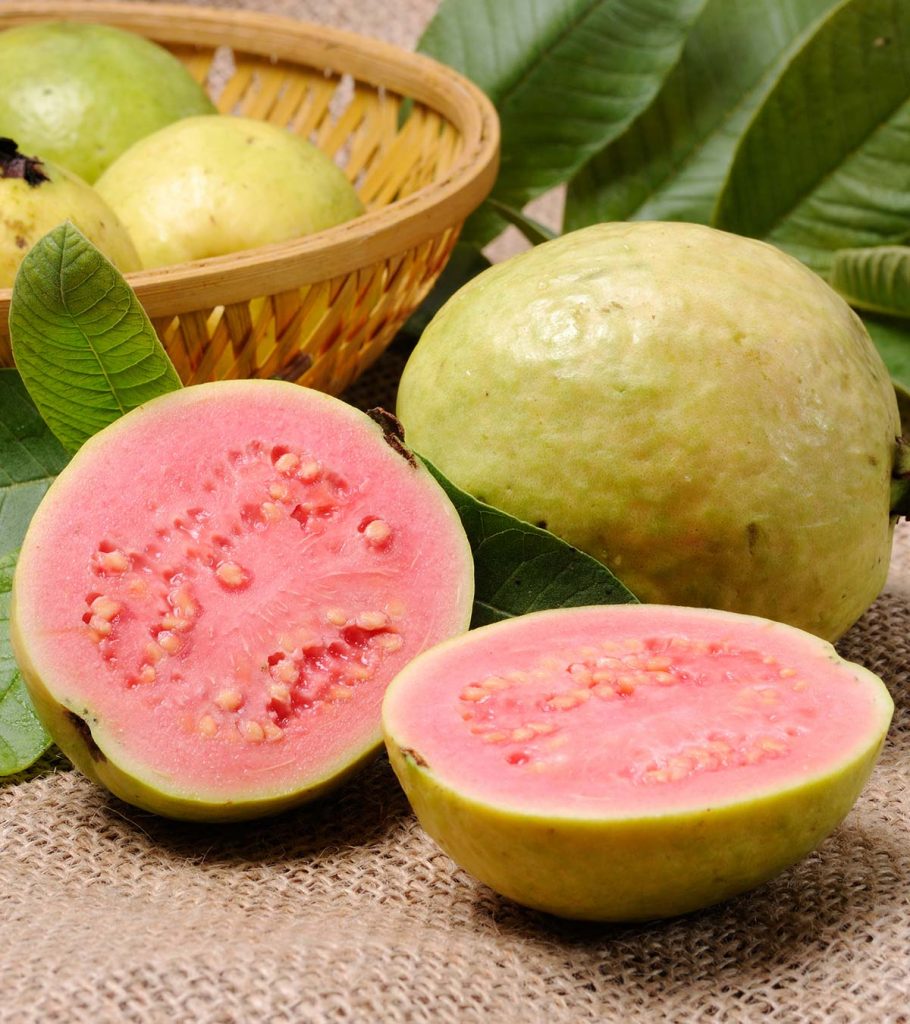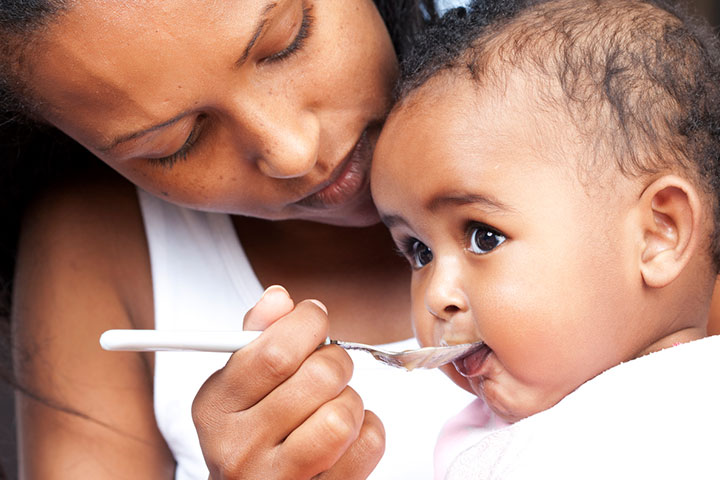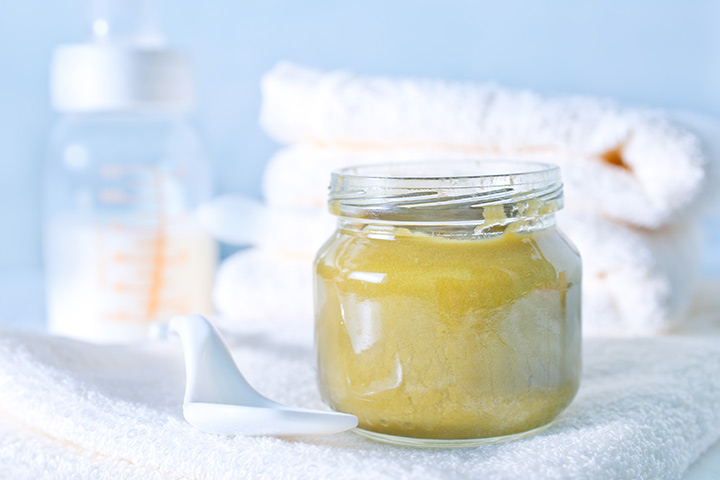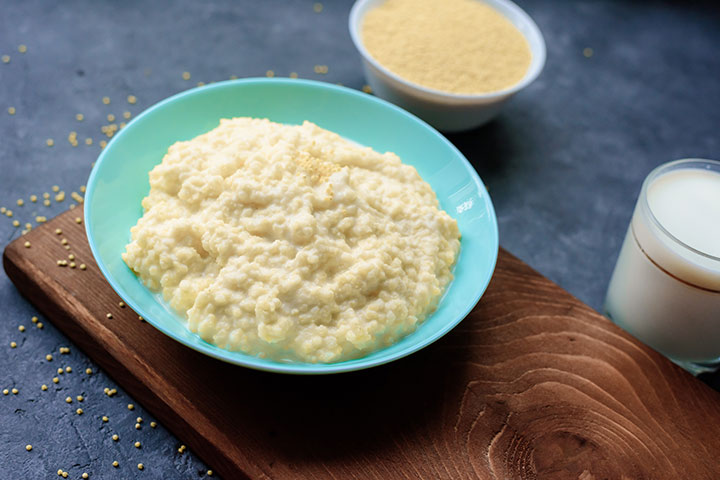Guava (Psidium guajava) is a tropical fruit people consume worldwide for its medicinal properties. The health benefits of guava for babies are numerous, and it contains several nutrients and bioactive compounds that promote long-term health.
Different parts of the guava plant possess antimicrobial and possibly anticancer properties (1). However, knowing the right age and age-appropriate ways to feed guava to your baby is important.
Keep reading to learn more about whether it is safe for babies to consume guava, its nutritional value, possible health benefits, and side effects. It also provides some easy guava recipes you can make for your baby.
Is Guava Safe For Babies?
Yes, guava is safe for infants and may add to your infant’s nutrition. The U.S. Food and Drug Administration refers to guava as Generally Recognized As Safe (GRAS) for consumption (2). However, give it in moderation. Also, make it a part of a balanced diet instead of giving it as a standalone food.
The American Academy of Pediatrics (AAP) recommends starting weaning food once your baby displays signs of readiness. Feed a variety of baby-led weaning foods with continued breastfeeding at least until the baby turns a year old (3).
At What Age Can Babies Start Eating Guava?
Babies can have guava by the age of six months. This is a safe age as the baby starts eating other complementary foods such as rice and potato. However, as you introduce guava to your baby, start in the form of a fruit puree and then transit to soft, cooked guava. You might also like to try mashed (peeled and deseeded) guava.
Do not give guava juice to your baby as babies younger than one year are not recommended fruit juices (4).
Nutritional Value Of Guava
The flesh of guava ranges from pink, white, yellow to red. It is rich in essential micronutrients such as vitamins A ,B ,E and C, folic acid, phytochemicalsiXNatural chemicals produced by plants that help prevent diseases and promote good health., aminoacidsiXChemical substances that combine to form proteins, crucial for major bodily processes, dietary fiber, minerals like magnesium, phosphorus, iron, manganese, potassium, and copper (1). Besides, it is also known to have certain bioactive compounds, which have health-promoting effects.
Below is the nutritional composition of one raw guava (55g) with recommended dietary values for each nutrient (5) (6).
| Name | Amount | RDA |
|---|---|---|
| Water | 44.4g | – |
| Energy | 37.4kCal | – |
| Carbohydrate, by difference | 7.88g | – |
| Fiber, total dietary | 2.97g | – |
| Sugars, total including NLEA | 4.91g | – |
| Calcium, Ca | 9.9mg | 270mg (7-12 months) |
| Iron, Fe | 0.143mg | |
| Magnesium, Mg | 12.1mg | 75mg (7-12 months) |
| Phosphorus, P | 22mg | 275mg (7-12 months) |
| Potassium, K | 229mg | 700mg (7-12 months) |
| Sodium, Na | 1.1mg | 200mg (7-12 months) |
| Zinc, Zn | 0.127mg | 5mg (7-12 months) |
| Copper, Cu | 0.127mg | 0.6-0.7mg (7-12month) |
| Vitamin C, total ascorbic acid | 126mg | 35mg (7-12 months) |
| Thiamin | 0.037mg | 0.3mg/1000Kcal |
| Riboflavin | 0.022mg | 0.5mg (7-12 months) |
| Niacin | 0.596mg | 6mg (7-12 months) |
| Vitamin B-6 | 0.061mg | 0.6mg (7-12 months) |
| Folate, total | 27µg | 35µg (7-12 months) |
| Choline, total | 4.18mg | – |
Sources: U.S. Department of Agriculture and World Health Organization
Health Benefits Of Guava For Babies
Moderate yet regular consumption of guava allows the baby to reap the following health benefits from the fruit.
- Good for digestive health: A research study published in the British Journal of Nutrition showed that dietary fiber and phenolic compoundsiXAntioxidant compounds naturally and widely found in foods derived from plants and animals in guava could promote good intestinal health (7). The dietary fiber present in the fruit also helps healthy bowel movement and keep constipation at bay. Its high water content aids digestion and hydration.
- Helps gut bacteria: The peel and pulp of guava contain antioxidant dietary fiber (8). Guava’s dietary fiber has shown potential in supporting the gut microfloraiXA group of microorganisms that colonize the gut and promote digestive and overall health. (9). A robust gut microflora helps in the proper absorption of nutrients.
- Boosts immunity: The fruit has high amounts of vitamin C and other valuable bioactive compounds such as carotenoidsiXColored pigments found in plant-based foods that act as a precursor in the synthesis of vitamin Athat could help in boosting immunity due to their antioxidative effects (10) .
- Supports vision: Regular consumption of carotenoids in the diet could support vision development (11). Guava is a good source of carotenoids, which could help maintain healthy vision and have protective effects over macular degenerationiXAn eye disease that affects an individual’s central vision and may gradually lead to a loss of vision., in the long run (12).
- Brain development: Guava has good amounts of vitamin A that could help in brain development (13). It also has other important micronutrientsiX Essential nutrients, including vitamins and minerals that the body requires in low quantities.such as vitamin B1, B3, and B6 that are also good for the brain (14).
- Neuroprotective effects: The pulp of the fruit contains a carotenoid called lycopene with more of the compound found in pink-fleshed guava (15). Lycopene has shown protective effects against neurodegenerationiXA gradual disintegration of neurons and nerve cells that impairs the proper functioning of the brain and the body, in the long run (16).
- Improves overall health: Guava possesses several health benefits that are attributed to its anti-viral and anti-inflammatory activities. Its extract shows antinociceptive (pain suppression) activity and is also effective against inflammation. The high content of organic and inorganic compounds like polyphenols are also beneficial to the skin (17).
Regular consumption of guava can be beneficial, but one should be aware of its potential side effects as well.
Side Effects Of Guava For Babies
The use of guava leaf extract or guava supplements for babies is not considered safe. Pediatric consultation and approval is a must for using these products. However, for guava fruit, no adverse effects or risks are documented except guava allergy.
Guava allergy is uncommon yet possible (18). Therefore, practice caution while feeding guava to your baby, especially if they have any existing allergies. However, avoid feeding guava at bedtime as it increases energy levels and may cause disturbed sleep .
Precautions To Take While Feeding Guava To Babies
Consider the following points when feeding guava to your baby.
- Give soft, cooked, and mashed or pureed guava in the beginning.
- Offer small quantities, i.e., one to two teaspoons initially. Once your baby is comfortable, you may gradually increase the quantity.
- Guava contains small seeds that can be hard to digest for infants. Therefore, remove the seeds when you make a pulp or puree.
- Go slow in the beginning. Follow the three-day wait rule. This will help you determine if guava is suitable for your baby. Meanwhile, do not introduce any new food to your infant.
- If your baby shows any signs of discomfort after eating guava, then stop feeding the fruit. Consult a doctor before serving guava to the baby again.
- Guava is acidic, largely due to malic and citric acid and excessive consumption might cause stools to become acidic as well. This may cause a diaper rash. Therefore, serve guava in moderation.
In the next section, we suggest some tasty guava recipes for your baby.
Guava Recipes For Babies
Prepare various recipes with guava depending on the age of the baby. Below are some recipes that you might like to try.
1. Mixed guava puree
This is an ideal recipe for babies between the ages of six to eight months. The puree is highly nutritious with abundant vitamin C and other valuable nutrients.
You will need:
- 1 guava (mashed)
- 1 kiwi (chopped)
How to:
- Take the chopped vegetables. Deseed them and then make a puree.
- Mix guava and kiwi puree together.
- Serve it to your baby as a midday snack.
2. Oats guava porridge
You can serve this baby porridge as breakfast. It will provide umpteen soluble fiber from oats and valuable micronutrients from guava to support your baby’s needs well.
You will need:
- 1 cup oats
- 5 cups water
- 1 cup milk
- 1 guava, ground to a paste
- Jaggery powder, to taste
- 1tbsp dry fruit powder (optional)
How to:
- Take a thick bottom pan and put it on medium flame. Add water into it and let the water boil.
- Now soak the oats in the boiling water for five minutes.
- Cook the oats well. When they are done, they look mushy.
- Now add milk and jaggery. Cook for three to four minutes and add the guava paste.
- Mix the paste well with the oats. Lower the flame, cover the pan with the lid and let the oats simmer for two to three minutes.
- Transfer the porridge to a bowl. Sprinkle some dry fruit powder and serve.
In addition to these recipes, you may also incorporate guava in their desserts, baby smoothies or milkshakes and add variety to your baby’s diet. Guava for babies can be a nutritious addition to their diet after six months. You can mash into their soft diet to make it easier to swallow as big chunks may pose a choking hazard. It contains various vitamins and bioactive components that help support your baby’s general health. It also has several health benefits for babies, including enhanced digestion, vision, and immunity. However, remember to feed your baby the fruit in moderation and avoid giving little guava seeds. Also, don’t use it as a sole source of nutrition for your infant. Instead, incorporate it into your baby’s well-balanced diet daily.
Key Pointers
- Guava is a highly nutritious fruit found worldwide, known for its medicinal and health benefits.
- It contains essential nutrients such as vitamin C, antioxidants, folic acid, and dietary fiber.
- Guava can benefit infants by boosting their immunity and supporting their vision and brain development.
- However, it is recommended to introduce guava to infants only after they are six months old and in small quantities in a soft and easily digestible form.
Explore the remarkable health advantages of guava fruit and its possible adverse reactions. Discover the ways this delightful fruit enhances well-being and boosts your health.















